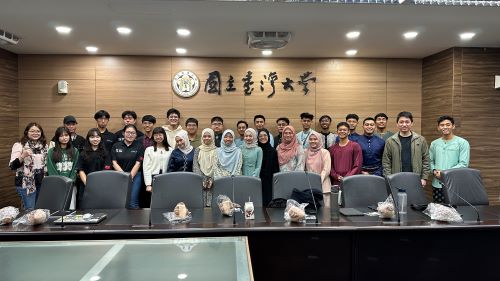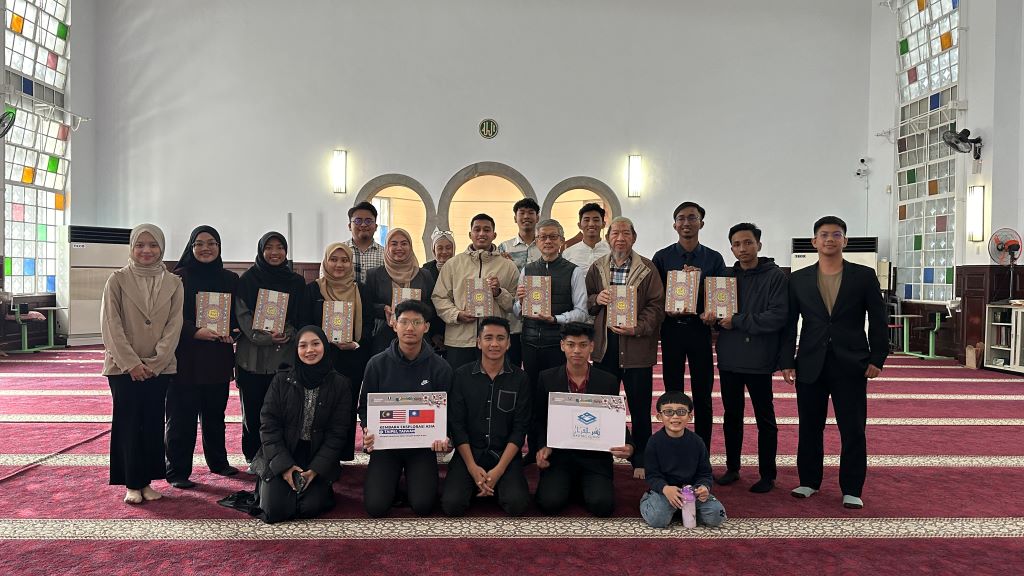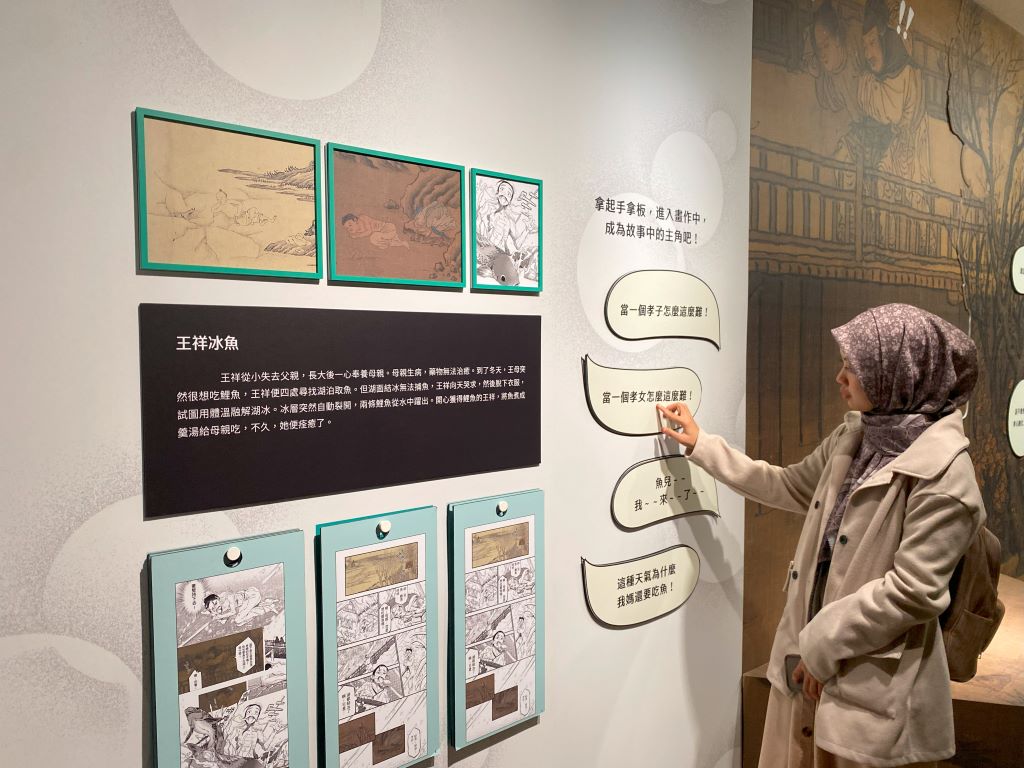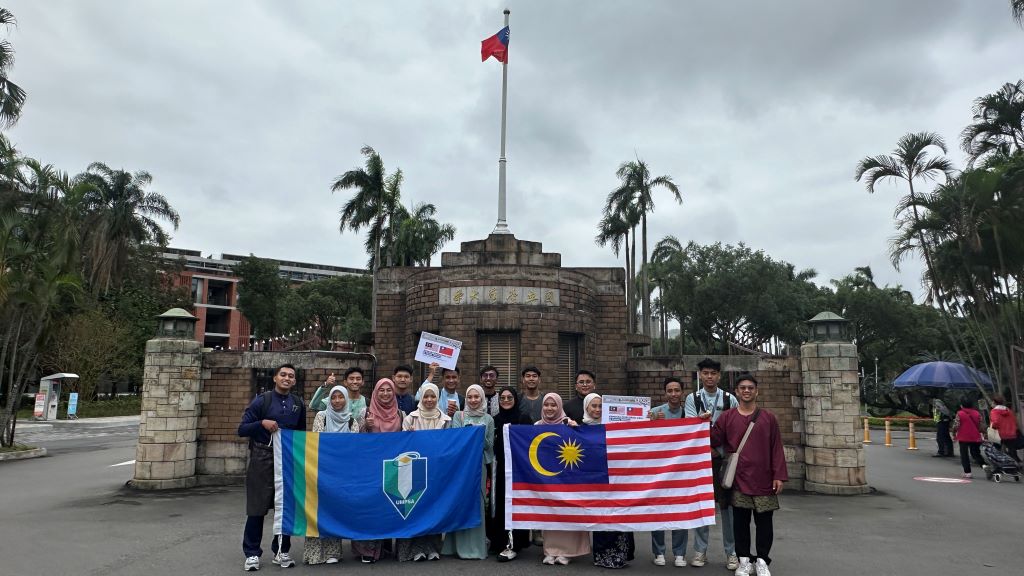From Technology to Tradition: Students’ learning in Taiwan opens their eyes to a wider world
TAIPEI, TAIWAN, 26 November 2024 – A total of 17 students and staff from Universiti Malaysia Pahang Al-Sultan Abdullah (UMPSA) recently participated in the International Mobility Programme in Taipei, Taiwan.
The six-day programme provided participants with the opportunity to explore educational, cultural, and volunteerism aspects, shaping them into individuals with a global vision.
One of the key activities was a visit to National Taiwan University (NTU), one of the best universities in Taiwan.
Participants had the chance to exchange ideas with NTU students and the NTU Racing Club, while also learning about technological innovations such as the construction of racing cars that have won international competitions.
The students also had the opportunity to explore the NTU campus, which was established in 1928, witnessing its classic architecture and learning about the history of the institution.
According to Khairul Amir Khairuddin, a student from the Faculty of Mechanical and Automotive Engineering Technology (FTKMA), he and his friends were inspired by the dedication and creativity of NTU students.
“It opened our minds to how technology can be used to create practical and impactful solutions while providing input for my upcoming projects,” he said.
According to the activity facilitator, Ein Noor Arisya Riza Shukri, in terms of volunteerism, participants carried out educational programmes at the Al-Hadi Taiwan Islamic Education and Culture Center (TIEC), teaching children to use digital platforms such as Arduino robots, Code Combat, and Scratch Jr to cultivate interest in STEM.
“Seeing the joy of the children when using Arduino robots indirectly gave us satisfaction because we were able to spark their interest in STEM.
“We also contributed school bags to the children at Al-Hadi TIEC and donated Mandarin-translated Quran waqf copies at the Grand Taipei Mosque, while helping to clean the mosque compound as a gesture of social care.
“These activities instilled values of volunteerism and responsibility towards the community among participants,” she said.
The programme also gave participants the opportunity to explore iconic locations such as the National Palace Museum, Chiang Kai-shek Memorial Hall, and Wulai Atayal Museum.

The educational visit to the National Palace Museum in Taipei, which houses nearly 700,000 artefacts and artworks, provided students with a valuable opportunity to learn about Chinese cultural heritage.
UMPSA students who participated in the mobility programme to Taiwan had the chance to visit the exclusive “Beauty Speaks for Itself” exhibition at the National Palace Museum, Taipei.
The exhibition, which runs from 26 September to 29 December 2024, features over 260 works of art connecting various cultures and eras, a collaboration between the museum, Musée des Arts Décoratifs, and Van Cleef & Arpels.
With five main thematic categories, such as nature, movement, and colour, the exhibition gave students the opportunity to appreciate the extraordinary beauty of art while broadening their perspectives on global cultural heritage rarely seen elsewhere.
The exhibition also highlighted the importance of art in life and how it can endure through the ages.
In addition, participants of this mobility programme visited the Chiang Kai-shek Memorial Hall, which gave students the chance to delve into Taiwan’s important history, particularly the struggles of the first President of the Republic of China, Chiang Kai-shek, in defending Taiwan from communism after the Chinese Civil War.
This memorial reflects Taiwan’s unity and national identity through its architectural design, which combines traditional and modern elements.
Another museum visited by the participants was the Wulai Atayal Museum, which gave students the opportunity to appreciate and understand the culture and heritage of the Atayal tribe, one of Taiwan’s indigenous ethnic groups.
The museum showcases artefacts, traditional clothing, and daily life tools of the Atayal tribe, paying tribute to their way of life that has endured for centuries.
According to Nurin Izzatie Rahamdan, one of the programme participants, visiting the Wulai Atayal Museum allowed her to feel the depth of the history and culture of the Atayal tribe that has survived for centuries.
“I was deeply moved by their way of life and their close connection with nature.
“Through the exhibits displayed, I realised the importance of preserving this cultural heritage so that future generations can appreciate and continue these valuable traditions,” she said.
The experience of visiting Taiwan provided meaningful lessons for UMPSA students in overcoming the challenges they faced, such as finding halal food and places of worship.
Although Taiwan has a small Muslim community, participants in this visit realised the importance of appreciating the facilities available in Malaysia, particularly halal food and places of worship.
One of the students, Muhammad Irfan Zakwan Azli, said that although it was somewhat challenging to find halal food there, he greatly appreciated the halal restaurants that were thoughtfully provided.
“This experience made me appreciate the facilities available in our country even more.”
Throughout the educational visit programme in Taiwan, students gained new and valuable learning experiences, particularly on the importance of preserving cultural heritage and appreciating national identity, as demonstrated at Chiang Kai-shek Memorial Hall and Wulai Atayal Museum.
They were also enriched with the awareness of the value of education and lifelong learning, inspiring them to continue developing their knowledge and skills in various fields.
The students were also fascinated by Taiwan’s rapid technological progress, where they witnessed how the country successfully combined modernity with cultural heritage.
Advanced infrastructure, such as efficient public transportation and innovations in technology, including artificial intelligence and green technology, became a source of inspiration for them to apply technology in daily life and future careers.
According to Ilyas Hakim Amir, “The efficiency of public transportation and innovations in technology made me think about how we can bring the same changes to our country.
“Technology is not only about economic progress but also about creating a better society.
“This awareness has encouraged me to improve the environment in our homeland and be more sensitive to public facilities,” he said.
The programme successfully shaped UMPSA students into individuals who are more knowledgeable, appreciative of available facilities, and committed to bringing positive change to Malaysia and the global community.
By: Nor Azlina Ahmad, Yayasan UMPSA
Translation by: Dr. Rozaimi Abu Samah, Faculty of Chemical and Process Engineering Technology
- 43 views












